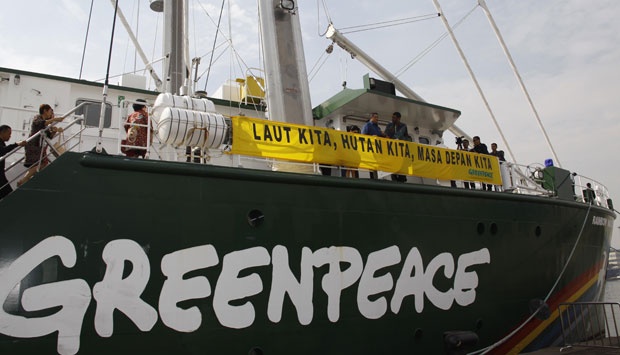
TEMPO.CO, Honolulu - After the most powerful El Nino on record heated the world's oceans to never-before-seen levels, huge swaths of once vibrant coral reefs that were teeming with life are now stark white ghost towns disintegrating into the sea.
And the world's top marine scientists are still struggling in the face of global warming and decades of devastating reef destruction to find the political and financial wherewithal to tackle the loss of these globally important ecosystems.
The International Coral Reef Symposium convened Monday to try to create a more unified conservation plan for coral reefs.
Federal officials said Monday the global coral bleaching event that began in 2014 with a super-charged El Nino is ongoing and is now the longest-lasting and largest such event ever recorded.
National Oceanic and Atmospheric Administration officials said that the event is expected to continue for its third year, lasting at least until the end of 2016.
While forecasters predict a change from El Nino to La Nina conditions, much of the warm water will remain in place or shift to other regions throughout the rest of the year.
All of the reef areas in the northern hemisphere — which includes almost all of the reefs in the United States — will experience another season of bleaching, said Mark Eakin, coordinator for NOAA's Coral Reef Watch program. Eakin noted that places like Hawaii and Florida have already had two consecutive years of severe bleaching, and a third is reason for concern.
"It's not likely to be as severe as last year according to the models, but time will tell," said Eakin. "It's very important for the managers to be ready for the fact that this may be a third year of bleaching."
Consecutive years of coral bleaching have led to some of the most widespread mortality of reefs on record, leaving scientists in a race to save them. While bleached coral often recovers, multiple years weakens the organisms and increases the risk of death.
Eakin said Palau and other Pacific islands in Micronesia face the biggest threats as warm waters push westward. Those islands are dependent on their reefs for both sustenance and the economic value of tourism.
"Local conservation buys us time, but it isn't enough," said Jennifer Koss, NOAA's Coral Reef Conservation Program director. "Globally, we need to better understand what actions we all can take to combat the effects of climate change."
"What we have to do is to really translate the urgency," said Ruth Gates, president of the International Society for Reef Studies and director of the Hawaii Institute of Marine Biology.
Gates, who helped organize the conference in Honolulu for more than 2,000 international reef scientists, policymakers and others, said the scientific community needs to make it clear how "intimately reef health is intertwined with human health."
She said researchers have to find a way to implement large scale solutions with the help of governments.
Researchers have achieved some success with projects such as creating coral nurseries and growing forms of "super coral" that can withstand harsher conditions. But much of that science is being done on a very small scale with limited funding.
Bob Richmond, director of the University of Hawaii's Kewalo Marine Laboratory, said the problems are very clear: "overfishing of reef herbivores and top predators, land-based sources of pollution and sedimentation, and the continued and growing impacts of climate change."
While reefs are major contributors to many coastal tourist economies, saving the world's coral isn't just about having pretty places for vacationers to explore. Reefs are integral to the overall ecosystem and are an essential component of everyday human existence.
Reefs not only provide habitat for most ocean fish consumed by humans, but they also shelter land from storm surges and rising sea levels. Coral has even been found to have medicinal properties.
In one project to help save reefs, researchers at the University of Hawaii's Institute of Marine Biology have been taking samples from corals that have shown tolerance for harsher conditions in Oahu's Kaneohe Bay and breeding them with other strong strains in slightly warmer than normal conditions to create a super coral.
The idea is to make the corals more resilient by training them to adapt to tougher conditions before transplanting them into the ocean.
Another program run by the state of Hawaii has created seed banks and a fast-growing coral nursery for expediting coral restoration projects.
Most of Hawaii's species of coral are unlike other corals around the world in that they grow very slowly, which makes reef rebuilding in the state difficult. So officials came up with a plan to grow large chunks of coral in a fraction of the time it would normally take.
Coral reefs have almost always been studied up close, by scientists in the water looking at small portions of reefs.
But NASA's Jet Propulsion Laboratory is taking a wider view, from about 23,000 feet above. NASA and other scientists recently launched a three-year campaign to gather new data on coral reefs worldwide. They are using specially designed imaging instruments attached to aircraft.
"The idea is to get a new perspective on coral reefs from above, to study them at a larger scale than we have been able to before, and then relate reef condition to the environment," said Bermuda Institute of Ocean Sciences' Eric Hochberg, principal investigator for the project.
If the scientific community and the world's governments can't come together to address coral's decline, one of earth's most critical habitats could soon be gone, leaving humans to deal with the unforeseen consequences.
"What happens if we don't take care of our reefs?" asked Gates. "It's dire."
AP























